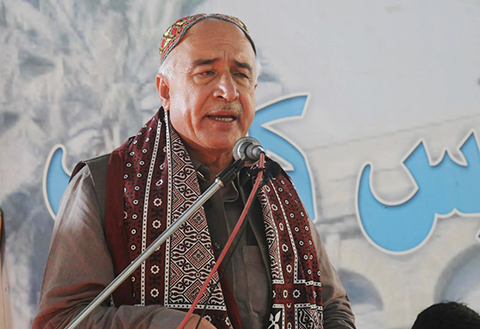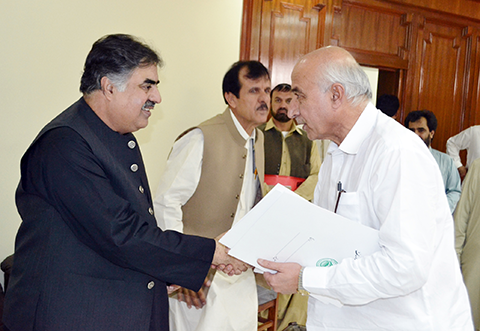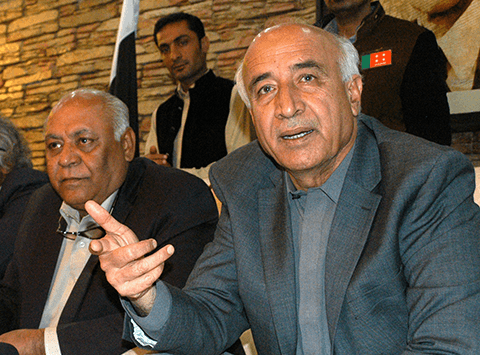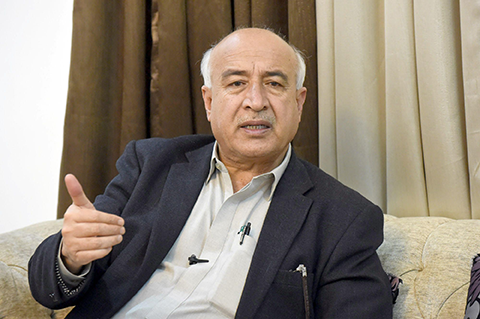Making space among conventional tribal leaders, Dr Abdul Malik Baloch became the first non-tribal, middle-class chief minister of Balochistan in 2013.
In stark contrast to the towering tribal leaders holding power for more than two decades such as the Marris, Bugtis and Mengals, Baloch is a simple man hailing from one of the most backward areas of Balochistan, Makran.
Previously, he served as the provincial health minister in Nawab Akbar Khan Bugti’s cabinet and has also served as the provincial education minister in 1993 and was later elected to the Senate in 2006 after forming National Party in 2004. He’s currently the president of the latter.
During his tenure as chief minister Balochistan, Baloch focused on health, education, and law-and-order situation brining about an evident decrease in violence and target killings across the province.
Following the vision of Mir Ghaus Bizenjo, one of the founding members of National Awami Party (NAP), Baloch claims to be anti-tribal, anti-feudal, anti-imperialist, secular and pro-democracy and believes in working under the constitutional framework of Pakistan. However, he deems dialogue with narrow-nationalist, separatists Baloch militants important for curbing insurgency in the province.
Even though he was born in a political family, Baloch started his political innings by joining Baloch Students Organisation (BSO).
He recalls going to anti-Ayub Khan protests as a school-going child reinforcing that politics was, indeed, is in his blood.
Baloch received early education from a local school in Turbat, followed by intermediate education at Ata Shad Degree College, Turbat. He specialised in ophthalmology from Bolan Medical College. Baloch talks to Narratives Magazine…
Balochistan’s problem has to be seen from a broader perspective. For instance, we have our own grievances against the centre, bureaucrats and the army which is that Islamabad wants to own everything, but they neglect us in the sense that we are a majority province (area-wise), we have resources and are situated strategically. They own Balochistan but not its people
- Do you think the ouster of Imran Khan was due to a foreign conspiracy or interference?
Abdul Malik Baloch (AMB): I personally think that it wasn’t a conspiracy but a democratic process through which he was voted out in the vote of no-confidence motion. This parliament can both elect and impeach. Imran Khan is arrogant because of which it is the first time in Pakistan that a prime minister didn’t accept the Constitution, the Supreme Court and high courts.
It is common knowledge that Imran Khan and his leadership isn’t anti-imperialist. To the contrary they have imperialist tendencies. Unfortunately, the public in Pakistan can be manipulated easily which is why they’re buying his concocted narrative and slogans.
- Even if Imran Khan is depending on sloganeering to move forward in politics do you think these corrupt, self-professed democratic leaders with dynastic fiefdoms an alternative to him and his party?
AMB: If you look at the legacy of Pakistan, there are two parties, who have mostly ruled the country and they are known through their families. Most of the parties have no collective leadership and decision-making. It’s a one-man show. There is no room for criticism. In my opinion, this 12-party coalition government must go towards immediate elections. There is a need to take a fresh mandate… and the establishment will have to stay neutral. Unless the establishment wouldn’t respect public’s vote, electioneering process will keep being disrupted.
- PTI, despite its drawbacks, at least isn’t dynastic. Why didn’t your party enter into an alliance with the PTI?
AMB: No, I don’t see myself supporting PTI or Imran Khan since I’m a product of politics. PTI hasn’t gone through a political process. We have done politics since we were in high school, have seen martial law, difficulties. This didn’t happen with PTI. PPP struggled initially and if you look at the PML-N’s history, they faced obstacles as well. I mean to say that PTI runs the show through sloganeering which isn’t the solution to problems of the masses. In their almost four-year tenure, the country didn’t go in the right track, economically, or in terms of foreign policy. Neither did they work with the opposition or enter into a dialogue with them. PTI didn’t deal with power and governance well.

- You formed a coalition government with PML-N and held power as chief minister Balochistan, through the Murree agreement. PML-N is considered a Punjab-centric party. Once upon a time, nationalists blamed Punjab for taking most of the resources from all provinces, including Balochistan. What made you take this decision? How did it help the people of Balochistan?
AMB: During PPP’s government from 2008-2013, the state institutions were crippled, violence prevailed on a daily basis. When we took part in 2013 elections, we were successful on 11 seats and PkMAP had 14 seats. At that time PML-N and PkMAP’s Muhammad Khan Achakzai took the decision that this time around such a political leadership should come forth which will have their own vision, as I have mentioned, during the previous regime the conditions in Balochistan deteriorated. We didn’t ask for it from PML-N.
The Murree agreement stated that we would take power for two-and-a-half years and PML-N would step up for the remaining tenure, we shouldn’t have agreed to it. But Mian Nawaz Sharif assured us that his party would calm down by then and we can continue with our government and the position of the chief minister of Balochistan. Basically, this was our understanding, which didn’t materialise.
- It has been noted that poverty in Balochistan exists because of the Baloch elite and sardari system. Don’t you think Baloch politicians manipulate the masses where Mengal, Bugti and Marris have ruled for years apart from being in the limelight?
AMB: Balochistan’s problem has to be seen from a broader perspective. For instance, we have our own grievances against the centre, bureaucrats and the army which is that Islamabad wants to own everything, but they neglect us in the sense that we are a majority province (area-wise), we have resources and are situated strategically. They own Balochistan but not its people.
This, I believe, is because they haven’t been given complete power to set their own candidates at the helm of power in the province. It has been their formula to take sardars to their side and then exploit the masses. Most of the sardars, who were with the centre and changed parties, are equally involved in this exploitation by Islamabad but unfortunately when we talk about sardars we only mention Bugti, Mengal although there are 70 other sardars and the same sardars were in PML-Q, then PPP, PML-N and now in BAP.
- Your party, National Party (NP) have two senators but no seat in the provincial and national assemblies. Why were you unable to garner mass support or get seats in the parliament?
AMB: We are the product of Baloch Students Organisation (BSO) and haven’t paid much heed to being in power.
When vote of no-confidence was tabled against Sanaullah Zehri in Balochistan Assembly it was us and Mahmood Khan who took a stand for him although he later went on and resigned.
It is then that our trouble with establishment began.
We suggested Sanaullah Zehri to not resign and leave it on the public of Balochistan to choose their leader.

When Balochistan Awami Party (BAP) was formed they said that PkMAP and NP wouldn’t win elections in the constituencies where we could have won. Right now, the establishment says that we won’t interfere in the elections while back in 2018 they rigged the elections.
We believe complete rigging took place by the establishment.
- Why do you think that establishment will stay neutral in the next elections?
AMB: I don’t say they will be; I’m stating that they should be neutral. Because if elections in Balochistan are manipulated on a continuous basis then the people of Balochistan would further not trust the democratic process, just a few of us are left, now our workers will also leave us if this trend is not dealt with. Therefore, we demand that Balochistan and people of Pakistan should be able to elect their candidates and parties.
- There was news of NP, Awami Workers Party (AWP) and Pakistan Mazdoor Kissan Party (PMKP)’s merger. However, your party chose to join PDM. Why would you not form a front or a robust alliance with progressive regional and national-level parties instead of these mainstream parties’ movement that no longer holds any kind of popular support?
AMB: We are ready to work on both fronts. PDM is a mainstream, broader front and the left, secular, democratic front, we tried our best for it, but it didn’t materialise. Nevertheless, it’s still our wish. We think that our vision is – even though very few people share our vision – to make our principles a priority and strengthen our perspective. We want to keep intellectuals and students of the same principles that we hold.
- But your party also keeps a sub-nationalist leaning…
AMB: Look, if you see our history, we preached progressive nationalism. We were anti-tribal, anti-imperialist, anti-feudal and we struggled for a secular society. If you don’t turn nationalism into fascism – which could mobilise masses – then it’s fine. But if you dig history then the largest left-wing alliance was that of NAP.
- What’s your take on militant Baloch nationalism and militancy, insurgency? How can it be curbed?
AMB: There are two schools of thoughts in Balochistan from the beginning. One was that of Ghaus Bakhsh Bizenjo that we must work with Pakistan, with its democratic forces to make it a federal, genuine democratic state where nations should be treated equally, their rights and resources, their languages are protected. The other school of thought, of Nawab Khair Bakhsh Marri was that we can’t stay with Pakistan, they were separationists. Now, Balochistan’s insurgency consists of those people who think there will be no real democracy in this country and the solution to this problem is through the use of force. However, we want to work under the constitutional framework, peacefully.

- What fuels the insurgency?
AMB: If these grievances were dealt with in the past 73 years the insurgency would not have initiated. This has been an outcome of constant injustice.
If the government of today, fails to address the missing persons’ issue in Balochistan the insurgency will only rise.
I don’t think taking up rifles either by the state or the insurgents is the solution to these problems. It should be resolved through negotiation which we started but unfortunately was discontinued afterwards.
- Although many say when politicians are not in power, they speak for missing persons but when in power, they ignore it…
AMB: No, this isn’t the case when it comes to us. I went to Nawabzada Bramdagh Bugti, spoke to him, also spoke with Khan of Kalat that you should come and do politics under the law and Constitution of Pakistan. The solution to missing persons’ issue is that the grievances and despair of the people of Balochistan are addressed and a dialogue should be initiated without dialogue this matter won’t be resolved.
- When you were the chief minister of Balochistan what developments took place, could you root out corruption in the province, the vision you came with?
AMB: I was running a coalition-government, a very difficult one, although our vision was revolutionary but when it came to implementation it wasn’t the same. I tried my best. I improved the law-and-order situation if you take statistics into consideration. We increased the education budget from 4 per cent to 26 per cent. In a year, we formed six universities and colleges. So, we focused on health, education and law-and-order. We also promoted Baloch and Pashtun culture, other cultures too and we made seven languages legal officially. We also published books. This all ended after us.
- What was the toughest, most challenging decision, or measure you took after becoming CM Balochistan?
AMB: To improve the law-and-order we had to take tough decisions such as we made the police independent of MPA, we made its IG autonomous. We doubled the salaries of police officials. It is then that the police became a veritable force, although when we came to power it was in a dilapidated state.
- Do you think that the situation in Balochistan improved after the 18th Amendment which made the provinces autonomous to a large extent, did it help alleviate the problems of the province?
AMB: 18th Amendment is a huge feat in itself. I was involved in the struggle for it. But the centre is encroaching upon it. They have formed agriculture department, health department which are controlled by the federal government. 18th Amendment will be successful when there is pro-people government in provinces; only if you have a government that cares about the interests of the people of Balochistan and if they don’t compromise like they did in the Reko Diq case.
- You once stated in a conference that CPEC is a strategic corridor instead of an economic corridor. What did you mean by that?
AMB: We think that it is more strategical. The Baloch have concerns regarding it. Who will make sure that people are helped in terms of businesses and employment? Currently, 93 per cent of the revenue is taken by the Chinese and seven per cent by the federal government. We are left with nothing.
Most of our land has been bought by the land mafia, the residents will resultantly feel that they are occupying our land, moving towards coloniastion. Development should be pro-people not like colonisation making the indigenous people a minority, exploiting their resources.

- Now coming to basics, what made you join politics, what was your vision when you joined Baloch Students Organisation (BSO)?
AMB: I was very little when Ayub Khan’s regime was in place. My family was involved in politics. My brother and father were with Mir Ghaus Bakhsh Bizenjo. We were children when the movement against Ayub Khan started when my father went, we went along to protests with them. Then eventually joined BSO.
- What did you learn from student politics that today’s members of BSO or youth in general could benefit politically?
The trends of those days were different when we were involved in politics in 70s, 80s. There was two-bloc of politics. We were pro-Soviet Union, ant-imperialist, anti-feudalism. The politics of National Awami party (NAP) was the politics of BSO. We were like a student wing of NAP. Now that situation doesn’t exist.
In Pakistan, Ayub Khan and Ziaul Haq gradually put restrictions. First Ayub Khan banned trade unions and Ziaul Haq banned student unions. These martial laws intellectually and politically undermined the politics of working-class, of the oppressed. Students got demotivated, disillusioned. The state hasn’t left any space for student politics in Balochistan or even Pakistan. If anyone does something, the very next day a notification is issued. In all our universities, politics has been vilified, vehemently discouraged.
- BSO dispersed in 1980s, was there an external or internal reason for that?
We disseminated in 1985. There was no external reason for it. There was a leadership conflict. We had internal elections in which Raziq Bugti lost and he made his own group with Jalib Baloch and me and Ayub Jatak and Maula Bakhsh went the other way. It was not a conspiracy. We are responsible for it. We break away ourselves and then blame others for it, such as state power and agencies. At least, I honestly say that whoever has been involved in its dispersal were internal members of BSO. The breakup wasn’t on an ideological basis. In 1977, the conflict was ideological between Ghaus Bakhsh Bizenjo and Khair Bakhsh Marri after Hyderabad Jail. Former was pro-federation and the latter anti-federation. Presently, us, the National Party has formed BSO-Panjar. Panjar is the name of our newspaper.



